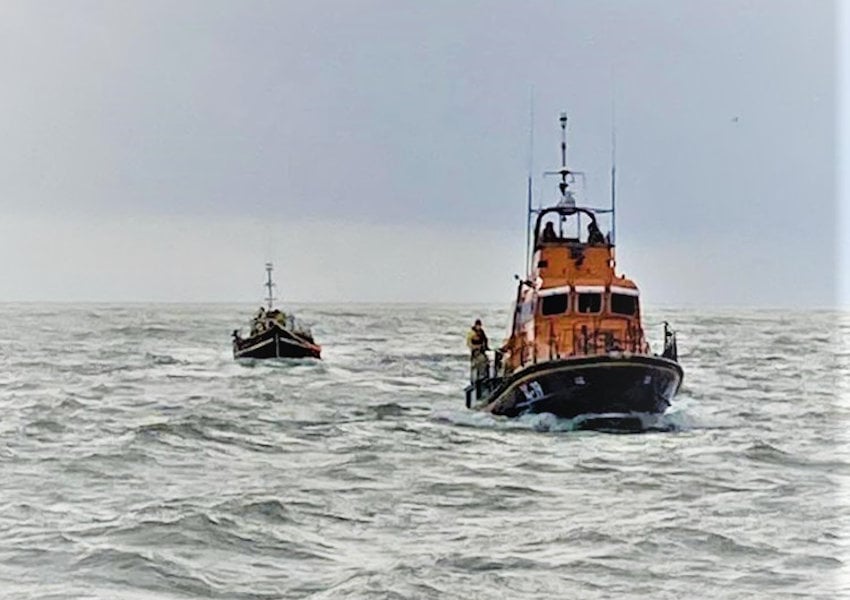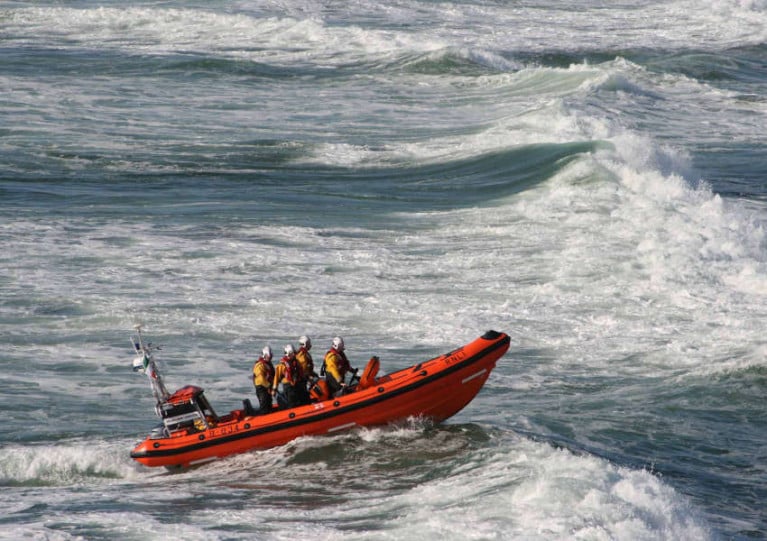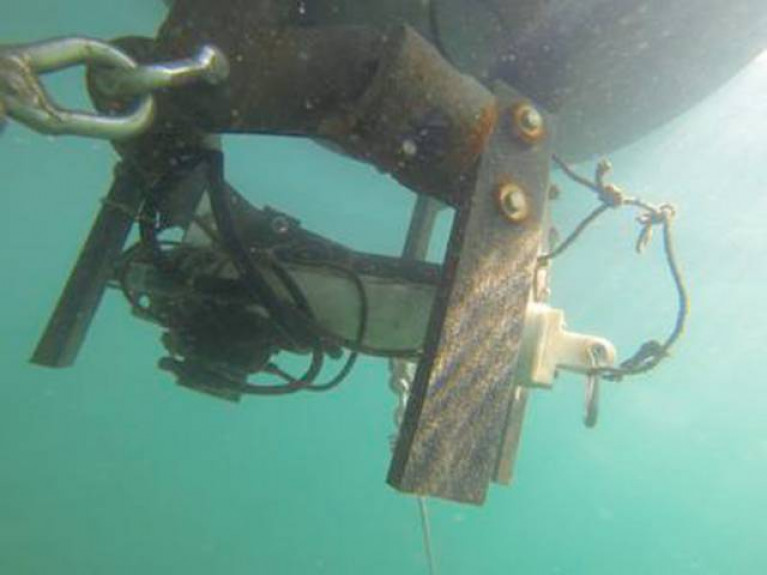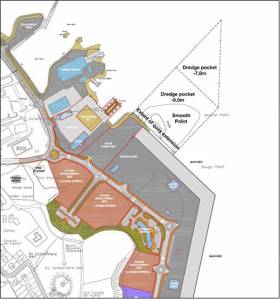Displaying items by tag: Killybegs
Killybegs Looking for Alternatives to Diesel for Fishing Boats
On-going efforts by fishermen to reduce their environmental impact, increase their efficiency and contribute to scientific data collection are continuing to enhance the sustainability credentials of seafood, Killybegs Fishermen’s Organisation has claimed.
The major Donegal-based fishing group is also looking for “ways and means of weaning the vessels off diesel.”
“While the fishing industry sometimes struggles to get the recognition it deserves for its importance to the Irish economy or as producers of highly nutritious low impact food, this is proof positive of the sustained work which KFO members are investing into long-term sustainability,” the Organisation’s Chief Scientific and Sustainability Officer, Dr Edward Farrell, has said
A report commissioned by the State’s seafood development agency, Bord Iascaigh Mhara (BIM), earlier this year, to which the KFO had significant input, found that carbon emissions for the sector are less than 2% of those produced in other key food sectors. It also stated that the carbon footprint of small pelagic species, such as mackerel and herring, is a mere fraction of land-based animal protein production.
“The KFO participated in a ground-breaking project called NEPTUNUS, the primary objective of which was to develop a life-cycle inventory database of seafood for the Atlantic Area. In addition to analysing fuel use and catch, the project has provided a carbon footprint for pelagic species, which reflects very positively on the industry here,” according to Dr Farrell. “Killybegs’ proximity to the main fishing grounds and our vessels' seasonal, targeted and selective fishing approach distinguishes them from foreign fleets landing the same species.
“While fuel accounts for the majority of the industry’s emissions, it is important to put this into context and look at the return on that energy investment, which in the case of small pelagic species was considerably higher than for land-based animal protein production.
Dr Farrell also revealed that the KFO is looking for alternatives to diesel as the fuel for its fleet: “We are probing ways and means of weaning the vessels off diesel. The KFO is working with several interested parties and research groups to explore the options, potential and realities of decarbonisation and the energy transition for our members’ vessels. As an industry wholly reliant on natural ecosystems for sustainable food production, the KFO is fully committed to sustainable fishing and ongoing reduction of its carbon footprint. “
First Woman Coxswain Appointed at Killybegs Coast Guard
Killybegs Coast Guard in Co Donegal has appointed its first ever female coxswain.
Amay Conneely takes up the new role alongside fellow new designated boat coxswain Conor O’Donoghue, both of whom are fully qualified to helm the Irish Coast Guard unit’s RIB.
The pair passed their assessments conducted last week by operations and training officer Jason Connery, the coastguard unit said in a statement on social media.
“Many years of hard work, a lot of training and countless courses have all paid of and we could not be happier for you two. We salute you,” the statement said.
It added: “Conor and Amay joined the same day with the Killybegs Coast Guard team here and it’s only fitting they crossed this milestone together.”
Killybegs Fishermen Challenge World Marine Scientists
The intergovernmental marine science organisation which advises the European Commission on fisheries regulations has been told by the Killybegs Fishermen’s Organisation that it has got its data wrong in recommending major fishing closures.
The Killybegs Organisation has challenged the International Council for the Exploration of the Sea (ICES) to examine and withdraw its recommendations on closing 87 areas of EU waters. The KFO Chief Executive says there are several errors in the data ICES used, which the KFO has identified and which make ICES decisions incorrect.
This is a serious challenge to the scientific body and to the European Commission, which, acting on ICES advice, closed the areas to bottom fishing last September.
 Killybegs Fishermen’s Organisation CEO Sean O’Donoghue
Killybegs Fishermen’s Organisation CEO Sean O’Donoghue
“We have carried out a major amount of work in looking at the underlying data, and we have found several errors in the data used by ICES,” KFO CEO, Sean O’Donoghue, told me. “The upshot of this is that there are significant errors in areas such as off the Donegal coast, indicating that there is no scientific basis for their decisions. We have notified ICES, the Commission and the Minister.
“There is no way that the existing closures on the ICES advice can be carried forward because they are not on a scientific basis. ICES must retract its advice and perform a full and transparent review. In the interim period, the European Commission should suspend the enforcement of the closed areas.
”KFO recognises the need for conservation and restoration of sensitive marine habitats and ecosystems. This is important not only for addressing the biodiversity crisis but also for supporting sustainable fisheries, which are critical for food security. We acknowledge that there is a need for areas to be closed to mobile contact bottom gears but these areas need to first be identified based on robust scientific evidence, which is currently not the case,” Mr O’Donoghue said.
In this week’s Podcast, he outlines the manner in which the Killybegs Fishermen’s Organisation is challenging ICES.
Listen to the Podcast below
It will be a bumper season in Killybegs Harbour as an unprecedented 28 cruise ships are scheduled to visit Co. Donegal, writes Jehan Ashmore.
The record total of cruise ships including 11 maiden calls will bring 50,000 visitors to the town and surrounding attractions in the north-west. With this level of visitors, the cruise season easily surpasses that of last year when 23 cruise ships arrived with 20,000 passengers.
In total the combined length of this year's cruise ships will be more than 6000m and 19 of them will each be more than 200m long. Handling these callers will be Killybegs based Sinbad Marine which will be acting as agents for the cruiseships.
At 326m, the longest cruise ship will be Norwegian Getaway which has a gross tonnage of 145,655 and a capacity for 3,963 passengers 1,646 crew. The giant cruise ship operated by Norwegian Cruise Line is due to call much later in the season in September.
A fleetmate the 294m Norwegian Star is however to open this year's season on 16th May. The same ship as Afloat reported is to close out the season off Dun Laoghaire Harbour in October.
Norwegian Star will be the most frequent caller to Killybegs with four visits stretching beyond that of Norwegian Getaway's once off aforementioned call in the Autumn.
Amongst the other cruise callers to Killybegs will be Ambience of UK based operator Ambassador Cruise Line which as Afloat reported was launched last year. The 70,235 gross tonnage ship then had made debut calls to Belfast and Cobh in Cork Harbour.
The 1,400 passenger capacity cruise ship recently returned to the southern port, marking the first caller of the season.
Marine Notice: Dredging and Quay Construction Works at Killybegs Fishery Harbour Centre
The Department of Transport has been advised that the Marine Engineering Division of the Department of Agriculture, Food and the Marine is undertaking dredging and quay construction works at Smooth Point in Killybegs Fishery Harbour Centre, Co Donegal.
As previously reported on Afloat.ie, the contract for the completion of works at Smooth Point was awarded in July to Sorensen Civil Engineering Ltd.
Works were set to begin last month and will continue until April 2023, subject to weather and operational constraints.
Plant on site includes a backhoe dredger, modular pontoon dredgers, split hopper barges, tugs and other smaller vessels.
For safety reasons mariners are requested to stay clear of the dredging zone for the duration of the works in the harbour and are requested to proceed with caution in the area of the new pier. Wave wash from vessels should be avoided.
A map of the dredging area as well as contact information can be found in Marine Notice No 77 of 2022, attached below.
Marine Minister Announces Award of Contract for Smooth Point Extension Completion Works at Killybegs
Marine Minister Charlie McConalogue today (Monday 18 July) announced the award of a €10.5 million (ex VAT) capital works contract to complete a 120m quay development and associated works for Smooth Point at Killybegs Fishery Harbour Centre in Co Donegal.
Welcoming the award of the contract to Sorensen Civil Engineering Ltd, the minister said: “Killybegs Harbour is Ireland’s premier fishing port and as such can be exceptionally busy. This project will see the long-waited completion of 120 metres of additional quay space in the harbour and, as a result will alleviate congestion during the peak fishing season at this major port.”
This final phase involves the removal of the remaining uncontaminated sediments and construction of the additional 120m quay wall and was the subject of a public tendering process. It is expected that works will commence in a matter of weeks and that the project will be substantially completed within seven months.
Minister McConalogue added: “The Irish seafood industry faces ongoing challenges, such as the significant challenge of Brexit. The completion of this project at Killybegs contributes to protecting our coastal communities and creating the opportunity for the seafood industry to continue to grow, prosper and facilitate a simultaneous growth of other ancillary marine industries.”
The Chairman of the Irish Fishing & Seafood Alliance has accused the Sea Fisheries Protection Authority of causing serious losses and the temporary closure of a processing factory in Killybegs.
The Danish fishing vessel MV Ruth, arrived to land 1,270 tonnes of blue whiting for local processing and export to Africa but left port with the fish still aboard.
“The SFPA today has hit a new low" said Cormac Burke, Chairman, Irish Fishing & Seafood Alliance. "The Sea Fisheries Protection Authority refused landing permission unless fish were 'de-watered' which would make them unfit for human consumption. “Rather than see this ridiculous waste of a perfectly good, and valuable, fish commodity, the Skipper of the Ruth took the decision to leave Killybegs with its catch still on board and head back to Denmark. Apparently, word has spread quickly and it looks likely that future landings by Danish vessels to Irish fish processors is in serious jeopardy. The lost quayside value of approximately €350,000 euros is only the tip of the iceberg of the damage created by the SFPA in today’s actions. The processing factory which should have had 80-odd staff working over the next four or five days is now closed and these factory workers have each lost a week’s wages - not to mention the buyers of the product in Africa who are now left without a shipment.
“Many local Killybegs net and engineering companies, rely on these visiting vessels for work at a time when the Irish fleet has already exhausted their mediocre blue whiting quota and have tied up - this avenue of business may now be lost permanently,” Mr Burke posted on the Fishing & Seafood Alliance Facebook Page.
“Blue whiting is often landed in Killybegs for the local fishmeal factory and although this is also going to produce important products such as meal and fish oil, the need for water retention is not as great as it would be for processing for human consumption.”
Bundoran Lifeboat Assists in Recovery of Sunken Vessel off Killybegs
Bundoran RNLI’s volunteer lifeboat crew were requested to launch yesterday afternoon (Tuesday 22 December) to reports of a 19ft vessel that had sunk off Killybegs.
Also tasked to the scene were the Sligo-based Irish Coast Guard helicopter Rescue 118 as well as the Killybegs Coast Guard RIB, while help was sought from other vessels in the area.
On arrival, the lifeboat crew found that two people who had been on the sunken vessel had already made their way to safety and were treated by an ambulance at the Killybegs slipway.
The lifeboat then assisted the coastguard RIB in securing the vessel.
Lifeboat helm Rory O’Connor said: “Thanks to quick actions of all involved, this was another successful outcome and the two people will get to spend Christmas with their loved ones.
“It’s another example of inter-agency cooperation and we were glad to be able to assist our Irish Coast Guard colleagues.”
The incident came just two days after another inter-agency operation to rescue a man whose small boat ran aground on rocks in Ballyshannon, as previously reported on Afloat.ie.
 Arklow RNLI’s all-weather lifeboat Ger Tigchlearr taking a stricken fishing vessel under tow (Photo: RNLI/Arklow)
Arklow RNLI’s all-weather lifeboat Ger Tigchlearr taking a stricken fishing vessel under tow (Photo: RNLI/Arklow)
In other lifeboat news, Arklow RNLI launched to the aid of two fishermen on a vessel in distress last Thursday 17 December.
As the volunteer crew of six were en route, further reports came in that the fishing vessel had freed the foul but was adrift and dragging its anchor — and in danger of being driven up onto the rocks at Kilmichael Point.
Once on scene, the lifeboat crew worked quickly with the casualty vessel’s crew of two to establish a tow line, before the vessel was towed safely back to Arklow.
Following the incident, Arklow RNLI community safety officer Mark Corcoran gave a special shoutout to coxswain Eddie McElheron on his first callout in command of the all-weather lifeboat Ger Tigchlearr.
The Department of Transport, Tourism and Sport has been advised by TechWorks Marine that the lantern on the monitoring buoy in Killybegs Harbour has stopped working.
The buoy is part of environmental oceanographic monitoring for the Department of Agriculture, Food and the Marine in a project that began last September, and can be found at 54° 37.03' N, 008° 26.40' W.
The buoy is deployed on a dual mooring. Two small marker buoys indicate the locations of each of the buoy’s moorings. Vessel traffic will need to avoid this area.
The lantern will be repaired as soon as possible on the next viable tide and weather window. For further information contact TechWorks Marine at 01 236 5990.
Dredging & Quay Wall Construction Begins at Killybegs Fishery Harbour Centre, Co. Donegal
Dredging and quay construction works will be underway at Smooth Point, Killybegs Fishery Harbour Centre from late October 2019 until July 2020.
Plant on site shall include the Capall Mara Backhoe Dredger (Callsign: MBSF3), modular pontoon dredgers, split hopper barges, tugs and other smaller vessels. Appendix 1 provides details of the location in which these works are to take place.
The works will also entail the disposal of dredge sediments at a permitted dumpsite in Donegal Bay.
For safety reasons, mariners are requested to stay clear of these sites for the duration of the works in the harbour and are requested to proceed with caution in the area of the new pier and the vicinity of the dumpsite when disposal operations are on-going. Wave wash from vessels should be avoided.
For further information, please contact Killybegs Harbour Master’s Office on +353 (0)74 9731032.
































































